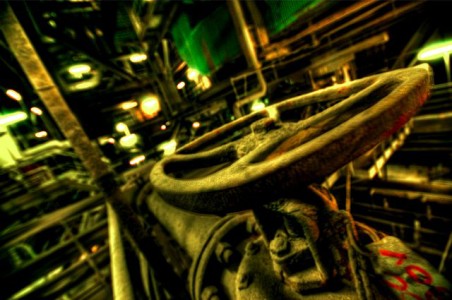I always get a little bit excited when I see the word “sabotage” in a news report, especially when it’s connected to environmentalism. As you might know, I am a proponent of sabotaging certain aspects of our destructive culture in order to free people up that they might change the way they live. This week I read with great interest about a coal fired power station in Kent, England, that has been the subject of a series of protests:
A turbine at a power station in Kent where climate change campaigners have been holding a series of protests was shut down by an intruder.
Energy company E.On said it believed whoever shut down the turbine must have had specialist knowledge to carry out the “potentially deadly” sabotage.
The shut-down happened on the night of 28 November during two days of action by the Camp for Climate Action group.
However, no organisation or individual has claimed it turned off the turbine.
“We don’t know whether it was a protester or not,” said E.On spokesman Jonathan Smith, “but they gained access to the site, tampered with a pretty specific board and managed to turn off unit two.
“It is completely unacceptable. If you ignore the fact they have broken into our site, what they were doing was potentially dangerous, potentially deadly even.”
During the shut down, the national grid had to make up the slack created by the loss of approximately 2% of the total electricity supply; it’s not a huge loss, and very easy to adjust to, but it was a significant action when compared to some of the “protests” that have recently taken place. With that in mind, I thought I’d take the chance to look at this action with reference to my Rules Of Sabotage, which you can read about here. Was this a worthwhile action, or could the saboteurs have done better?
1. Carefully weigh up all the pros and cons, and then ask yourself, “Is it worth it?â€
The judgement against this rule depends on what the saboteurs were intending. Most direct action is intended to shock the system in some way, rather than having any long-term effect, and if a shock was all that was wanted, then it succeeded pretty well, and got some significant publicity. But tampering with the electricity supply network is regarded as terrorism in the UK, so the overall risk was very high, especially as the power was unlikely to stay off for long. A tricky one, but overall I’m not convinced the outcome was worth the risk.
2. Plan ahead, and plan well, accounting for every possible eventuality.
The sabotage was successful in the context of the outcome sought, and the saboteurs must have know the electric fence was not live. They also had the technical expertise to shut the turbine off; so this definitely goes down as a well-planned action, which is also reflected in the next rule…
3. Even if you understand the worth of your action, don’t get caught.
They didn’t get caught – point proven, so far. Even more significant, no one has yet claimed responsibility; a very important, and interesting factor. Normally some group or other will say they did it, even in the most serious actions, but not claiming responsibility is one way of avoiding prosecution — the security services only need an organization name to identify a number of likely individuals. This is also significant because it may well have been a genuine “lone gunman” who has decided that current actions are not going far enough: we could be on the cusp of a wave of sabotage activity.
4. Make the Tools of Disconnection your priority; anything else is a waste of time and effort.
This is where the action falls down badly: sabotaging the electricity supply is all very well as a demonstration of the fragility of large power plant, but in terms of threatening the drive for new coal-fired power stations by the UK government, it will achieve little except to ensure security is stepped up. In this sense, a good form of sabotage would be to expose the true motivation behind the drive for coal – political corruption – so anyone who has access to government memos could be very useful; along similar lines, if it could be made clear that there was not a cat’s chance in hell of the carbon ever being sequestered then the main argument given for more coal plant would be blown out of the water.
Sabotage, in the truest sense, should hurt those who seek to gain most out of the Culture of Maximum Harm (i.e. Industrial Civilization) – the most powerful and most wealthy; take away the tools they use to control us, and you give people back their freedom.
